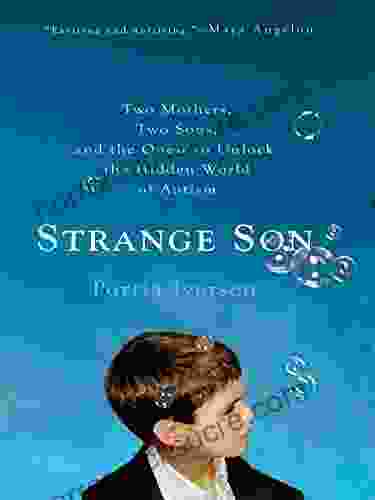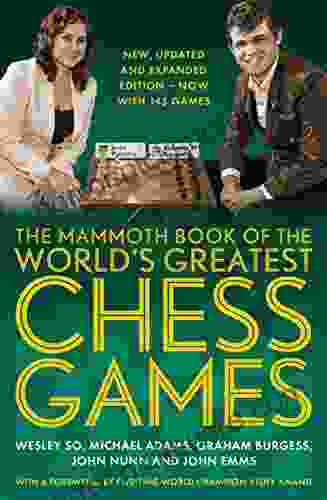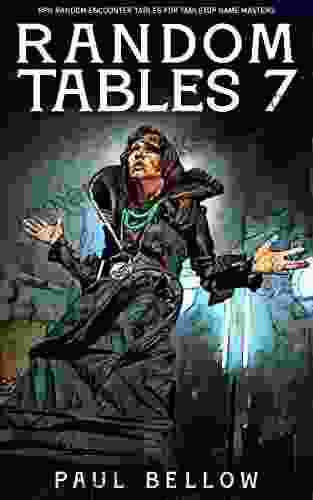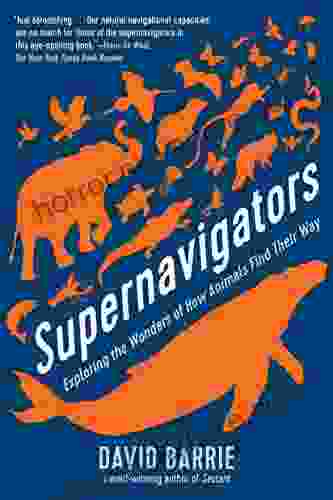Complexity: A Very Short Introduction - Unveiling the Interplay of Order and Disorder

In a world teeming with interconnectedness and intricate patterns, the concept of complexity has emerged as a powerful lens through which we can understand the dynamic nature of our surroundings. Complexity theory, an interdisciplinary field spanning science, mathematics, engineering, and even the humanities, explores the intricate interplay of order and disorder, the emergence of patterns from chaos, and the challenges and opportunities that complexity presents.
4.1 out of 5
| Language | : | English |
| File size | : | 1179 KB |
| Text-to-Speech | : | Enabled |
| Screen Reader | : | Supported |
| Enhanced typesetting | : | Enabled |
| Print length | : | 120 pages |
| Lending | : | Enabled |
The Realm of Complexity: Order and Disorder Intertwined
At its core, complexity is a characteristic of systems that exhibit a high degree of interconnectedness and nonlinear relationships between their components. These systems are often characterized by the emergence of unexpected behaviors, patterns, and adaptations that cannot be easily predicted or understood through traditional reductionist approaches.
Consider the human brain, an awe-inspiring example of a complex system. With its billions of neurons and trillions of connections, the brain exhibits a level of complexity that allows for higher-order functions such as consciousness, cognition, and creativity. The intricate interplay of these countless components gives rise to a system that is far more than the sum of its parts.
Emergence: The Birth of Patterns from Chaos
One of the most captivating aspects of complexity is the phenomenon of emergence. In complex systems, patterns and behaviors can spontaneously arise from the interactions of individual components without any central coordination or pre-programming. These emergent properties are often unpredictable and can lead to unexpected outcomes.
Take, for instance, the formation of flocks of birds. While each bird may follow simple rules of movement, the collective behavior of the flock exhibits complex patterns and adaptations. The emergent behavior of the flock, such as synchronized flight and coordinated turns, allows for efficient foraging, predator avoidance, and energy conservation.
Challenges and Opportunities of Complexity
The study of complexity has profound implications for various fields and disciplines. It challenges traditional scientific approaches that seek to reduce complex phenomena to their constituent parts and linear relationships. Instead, complexity theory emphasizes the importance of understanding the interactions and interconnections within systems.
However, the complexity of many real-world systems can pose significant challenges for scientific analysis. Traditional methods may fail to capture the intricate dynamics of complex systems, making it difficult to predict and control their behavior. Despite these challenges, the study of complexity offers immense potential for advancements in fields such as medicine, engineering, economics, and social sciences.
: Embracing the Complex Nature of Our World
As we delve deeper into the intricate nature of complexity, we gain a profound appreciation for the interconnectedness and dynamism of our surroundings. Complex systems, from the human brain to ecological communities, exhibit a fascinating interplay of order and disorder, giving rise to emergent patterns and behaviors that defy easy explanations.
Embracing the complex nature of our world requires a holistic and interdisciplinary approach that acknowledges the limitations of traditional reductionist methods. By embracing complexity, we open up new avenues for understanding, predicting, and navigating the challenges and opportunities that our ever-evolving world presents.
The study of complexity is a testament to the inherent interconnectedness of all things. It challenges us to think beyond linear relationships and reductionist approaches, and to embrace the intricate interplay of order and disorder that characterizes our world. As we continue to explore the frontiers of complexity science, we unravel the hidden patterns and dynamics that shape our universe and our place within it.
4.1 out of 5
| Language | : | English |
| File size | : | 1179 KB |
| Text-to-Speech | : | Enabled |
| Screen Reader | : | Supported |
| Enhanced typesetting | : | Enabled |
| Print length | : | 120 pages |
| Lending | : | Enabled |
Do you want to contribute by writing guest posts on this blog?
Please contact us and send us a resume of previous articles that you have written.
 Fiction
Fiction Non Fiction
Non Fiction Romance
Romance Mystery
Mystery Thriller
Thriller SciFi
SciFi Fantasy
Fantasy Horror
Horror Biography
Biography Selfhelp
Selfhelp Business
Business History
History Classics
Classics Poetry
Poetry Childrens
Childrens Young Adult
Young Adult Educational
Educational Cooking
Cooking Travel
Travel Lifestyle
Lifestyle Spirituality
Spirituality Health
Health Fitness
Fitness Technology
Technology Science
Science Arts
Arts Crafts
Crafts DIY
DIY Gardening
Gardening Petcare
Petcare Catherine White
Catherine White Neil Iton
Neil Iton Declan Lyons
Declan Lyons Steven Rinella
Steven Rinella Rich Roll
Rich Roll Eric Provan
Eric Provan Darcy Kieran
Darcy Kieran Joe Farinaccio
Joe Farinaccio Casey Schreiner
Casey Schreiner Rohan Agarwal
Rohan Agarwal Chris Cage
Chris Cage Kevin Easley
Kevin Easley John D Barrow
John D Barrow Liz Robbins
Liz Robbins Sona Charaipotra
Sona Charaipotra Mike Brown
Mike Brown Benjamin Smith
Benjamin Smith Nancy Mohrbacher
Nancy Mohrbacher Deborah D Gray
Deborah D Gray Maria Kriya
Maria Kriya Will Oxley
Will Oxley Wesley C Salmon
Wesley C Salmon Sarah Miller
Sarah Miller Clifford Geertz
Clifford Geertz Molly Mills
Molly Mills Carla Killough Mcclafferty
Carla Killough Mcclafferty Shelby Evans
Shelby Evans Laura Hoggins
Laura Hoggins George Daniel
George Daniel Mark Lutz
Mark Lutz Nsca National Strength Conditioning Association
Nsca National Strength Conditioning Association Peter Greyson
Peter Greyson Chuck Lukacs
Chuck Lukacs Scott Wilson
Scott Wilson Fran Zimniuch
Fran Zimniuch Leia Stone
Leia Stone Patti Jean
Patti Jean Lelah Sullivan
Lelah Sullivan Kevin Johnson
Kevin Johnson Tim Ingold
Tim Ingold Gerald G Briggs
Gerald G Briggs Kara Richardson Whitely
Kara Richardson Whitely Deanna Raybourn
Deanna Raybourn T L Christianson
T L Christianson Simon Armitage
Simon Armitage Edward O Wilson
Edward O Wilson Bill Hanstock
Bill Hanstock Marian L Tupy
Marian L Tupy David Lawson Phd
David Lawson Phd Haya Leah Molnar
Haya Leah Molnar Melissa De La Cruz
Melissa De La Cruz Edward Beauclerk Maurice
Edward Beauclerk Maurice Peter Brown Hoffmeister
Peter Brown Hoffmeister David Rynecki
David Rynecki Shelley C Safian
Shelley C Safian Michael P Nordvall
Michael P Nordvall Thomas Norman Dewolf
Thomas Norman Dewolf Chanda Hahn
Chanda Hahn Joe Baker
Joe Baker Jenson Button
Jenson Button Lisa Rene Reynolds Phd
Lisa Rene Reynolds Phd Ahlia Rose
Ahlia Rose Will Wraxall
Will Wraxall Mike Veny
Mike Veny Olivia Longray
Olivia Longray Martin Lee Abbott
Martin Lee Abbott Joe Clement
Joe Clement Ashley Lecker
Ashley Lecker Phil Davies
Phil Davies Shanterra Mcbride
Shanterra Mcbride John Huggan
John Huggan Erin Eileen Leigh
Erin Eileen Leigh Jill H Rathus
Jill H Rathus Heather Davis
Heather Davis Richard G Lomax
Richard G Lomax Nicola Griffith
Nicola Griffith Harriet A Washington
Harriet A Washington Roxanne Reid
Roxanne Reid Phil Stamper
Phil Stamper Bernard Lewis
Bernard Lewis Dudley Wright
Dudley Wright Dennis Fisher
Dennis Fisher Tracy Tresidder
Tracy Tresidder Bernardo Kastrup
Bernardo Kastrup Tracy Lash Decrosta
Tracy Lash Decrosta David Jeremiah
David Jeremiah W David Pierce
W David Pierce Tiffany Vincent
Tiffany Vincent Fr Mike Driscoll
Fr Mike Driscoll Brian Reddington
Brian Reddington Greg Schwipps
Greg Schwipps John Biggar
John Biggar L T C Rolt
L T C Rolt Blandine Calais Germain
Blandine Calais Germain Si Sheppard
Si Sheppard Lizzy Bolan
Lizzy Bolan Jonathan Wolf
Jonathan Wolf Rosalie Knecht
Rosalie Knecht Lawrence J Cohen Phd
Lawrence J Cohen Phd Gary Oberg
Gary Oberg John J Watkins
John J Watkins Cokie Roberts
Cokie Roberts Vinny Berry
Vinny Berry Educational Testing Service
Educational Testing Service Christina Hitchcock
Christina Hitchcock Justin Roethlingshoefer
Justin Roethlingshoefer Rainbow Rowell
Rainbow Rowell Maggie Dent
Maggie Dent Steve Schwartz
Steve Schwartz Elaine Stillerman
Elaine Stillerman Nate Summers
Nate Summers Ethan Sawyer
Ethan Sawyer Seth A Roberts
Seth A Roberts Stephan A Hoeller
Stephan A Hoeller Martijn Konings
Martijn Konings Howard Burton
Howard Burton Ciara Attwell
Ciara Attwell Beth Reekles
Beth Reekles Nadine Slavinski
Nadine Slavinski Huntley Fitzpatrick
Huntley Fitzpatrick Deborah Blum
Deborah Blum Maggie Kline
Maggie Kline Kris Wilder
Kris Wilder Carol Walters
Carol Walters Rui Zhi Dong
Rui Zhi Dong Jonathan Knight
Jonathan Knight Sandy Glenn
Sandy Glenn Sanjay Gupta
Sanjay Gupta Michael S Kelly
Michael S Kelly Eva Hoffman
Eva Hoffman Valentin Nugmanov
Valentin Nugmanov David Bain
David Bain T L Branson
T L Branson Slavka Bodic
Slavka Bodic Margaret E Murie
Margaret E Murie Janisse Ray
Janisse Ray Print Replica Kindle Edition
Print Replica Kindle Edition Roger Fredericks
Roger Fredericks Bb Easton
Bb Easton Jaimal Yogis
Jaimal Yogis Charlotte Mason
Charlotte Mason Rebecca Collins
Rebecca Collins Rachael Denhollander
Rachael Denhollander Sarah Elizabeth Richards
Sarah Elizabeth Richards Stuart James Amei
Stuart James Amei Jacqueline Marcell
Jacqueline Marcell Helen Leigh
Helen Leigh Oleg Senkov
Oleg Senkov Frank Galli
Frank Galli Benjamin Southerland
Benjamin Southerland Lori Ashley Taylor
Lori Ashley Taylor Makiia Lucier
Makiia Lucier Mario Cardano
Mario Cardano Phil Martin
Phil Martin Adam Stevens
Adam Stevens John H Holland
John H Holland Tom Dodd
Tom Dodd Joel Hooks
Joel Hooks Robert Page
Robert Page Ben Worthington
Ben Worthington Stefanie Molin
Stefanie Molin Theodore Gray
Theodore Gray Alan Levinovitz
Alan Levinovitz Kim John Payne
Kim John Payne Blythe Lucero
Blythe Lucero Mikki Morrissette
Mikki Morrissette Lawrence Baldassaro
Lawrence Baldassaro Ben Hoppe
Ben Hoppe Kenneth R Miller
Kenneth R Miller Percy Keese Fitzhugh
Percy Keese Fitzhugh Lsatmax Lsat Prep
Lsatmax Lsat Prep Laura Bashar
Laura Bashar Stefanie Reinhold
Stefanie Reinhold Philip A Moore
Philip A Moore Bertrand Russell
Bertrand Russell Brian M Conners
Brian M Conners Dan Orr
Dan Orr Budd Coates
Budd Coates Editors Of Martha Stewart Living
Editors Of Martha Stewart Living Heroes Of The Art
Heroes Of The Art Hannah Witton
Hannah Witton Gaby Melian
Gaby Melian Sheila Lukins
Sheila Lukins Portia Iversen
Portia Iversen Christian Beamish
Christian Beamish Joline Godfrey
Joline Godfrey Vasile Berinde
Vasile Berinde Theresa Bane
Theresa Bane Emma Walker
Emma Walker Chris Conley
Chris Conley Kristin Cashore
Kristin Cashore Lawrence Wright
Lawrence Wright Frank Ayres
Frank Ayres Nick Price
Nick Price Mike Settele
Mike Settele Jeremy Griffith
Jeremy Griffith Cathy Jackson
Cathy Jackson John R Bruning
John R Bruning Bob Raynor
Bob Raynor Benjamin Johnston
Benjamin Johnston David Quammen
David Quammen Bob Hazard
Bob Hazard Richard Dawkins
Richard Dawkins Thomas W Miller
Thomas W Miller Catherine B Walker
Catherine B Walker Lene Fogelberg
Lene Fogelberg John Fry
John Fry Jo Carol Claborn
Jo Carol Claborn Jean Louis Vidal
Jean Louis Vidal Daniel Boyarin
Daniel Boyarin Christopher Hill
Christopher Hill David Estes
David Estes Tomoko Fuse
Tomoko Fuse Chris Batha
Chris Batha Glenn Randall
Glenn Randall Lisa Mckay
Lisa Mckay Nancy Redd
Nancy Redd Bertil Gustafsson
Bertil Gustafsson Emma Mckinney
Emma Mckinney Kent Allen
Kent Allen Stephanie Baier
Stephanie Baier S Connolly
S Connolly Tony Frezza
Tony Frezza Christian Smith
Christian Smith Robert W Smith
Robert W Smith Rowan Ellis
Rowan Ellis Stephen Jenkinson
Stephen Jenkinson Timothy Gowers
Timothy Gowers Holly Black
Holly Black William Cane
William Cane Jane Bottomley
Jane Bottomley Rosamund Hodge
Rosamund Hodge Gwen Bettwy
Gwen Bettwy Rose Kearney Nunnery
Rose Kearney Nunnery Leila Kalmbach
Leila Kalmbach Bethany Warren
Bethany Warren Nathan Doneen
Nathan Doneen Jay Kirk
Jay Kirk Lindsey Vonn
Lindsey Vonn Debbie Marks
Debbie Marks Art Friedman
Art Friedman Eliza Larson
Eliza Larson Charlotte Mary Yonge
Charlotte Mary Yonge Dean R Giles
Dean R Giles Len Mcdougall
Len Mcdougall Patricia Leavy
Patricia Leavy Department Of The Army
Department Of The Army Ellen Galinsky
Ellen Galinsky Sarah Spencer
Sarah Spencer Peter Gieler
Peter Gieler Brent Majcher
Brent Majcher Sherry Turkle
Sherry Turkle Zoe S
Zoe S Peter L Berger
Peter L Berger Eliza Hof
Eliza Hof Tony Horwitz
Tony Horwitz Graham Burgess
Graham Burgess Hillary Sadler
Hillary Sadler Kate Williams
Kate Williams Lizzie Lane
Lizzie Lane Malin Gutestam
Malin Gutestam Colin Gordon
Colin Gordon David Diaz
David Diaz Natasha D Lane
Natasha D Lane L H Stacey
L H Stacey Scott Wetzler
Scott Wetzler Joe Baird
Joe Baird Octavia Steen
Octavia Steen Christine Desdemaines Hugon
Christine Desdemaines Hugon Deborah Taylor Hough
Deborah Taylor Hough William C Oakes
William C Oakes Glenn Bartley
Glenn Bartley Meghan Casey
Meghan Casey Vivienne Edgecombe
Vivienne Edgecombe Bernadette Noll
Bernadette Noll Joy Hendry
Joy Hendry Tim Tebow
Tim Tebow Joseph Ciarrochi
Joseph Ciarrochi Izaak Walton
Izaak Walton Carol Devine
Carol Devine Maggie Oakes
Maggie Oakes Charles E Farhadian
Charles E Farhadian Brandon Sanderson
Brandon Sanderson Bill W
Bill W Adam Griffith
Adam Griffith Nicola Morgan
Nicola Morgan Lebawit Lily Girma
Lebawit Lily Girma Bell Hooks
Bell Hooks Mark Csikszentmihalyi
Mark Csikszentmihalyi C C Hunter
C C Hunter Patricia Hachten Wee
Patricia Hachten Wee Farley Mowat
Farley Mowat John Dickie
John Dickie Rachel Ann Cullen
Rachel Ann Cullen Lucy Cooke
Lucy Cooke Lucy Ruddle
Lucy Ruddle Eileen Kennedy Moore
Eileen Kennedy Moore Lesley Pyne
Lesley Pyne Stephen Renwick
Stephen Renwick John Henderson
John Henderson Melissa Ford
Melissa Ford John E Eck
John E Eck Mindy Cockeram
Mindy Cockeram Jeremy Lent
Jeremy Lent Jack Buck
Jack Buck Ellen Schreiber
Ellen Schreiber Kelli L Ferguson
Kelli L Ferguson Kyle Simpson
Kyle Simpson Laurence S Moy
Laurence S Moy Ben Smith
Ben Smith Melina Palmer
Melina Palmer Kiera Cass
Kiera Cass Stephen Smith
Stephen Smith Dan Inosanto
Dan Inosanto Catherine Faherty
Catherine Faherty Mitch Terrusa
Mitch Terrusa Jon M Sweeney
Jon M Sweeney Brigid Kemmerer
Brigid Kemmerer David Sadker
David Sadker Karen J Rooney
Karen J Rooney John Mandel
John Mandel David Robson
David Robson Jeff Grubb
Jeff Grubb Sandra Brown
Sandra Brown Stacey Barrett
Stacey Barrett Molly Hurford
Molly Hurford Knowledge Flow
Knowledge Flow Larry Gabe
Larry Gabe Sally Moran
Sally Moran Virginia Smith Harvey
Virginia Smith Harvey Evelyn Underhill
Evelyn Underhill Peggy J Martin
Peggy J Martin Josh Gates
Josh Gates Christy Teglo
Christy Teglo Peter Isler
Peter Isler The Mountaineers
The Mountaineers Bella Bathurst
Bella Bathurst Tamarack Song
Tamarack Song Dan R Lynch
Dan R Lynch Ellen Meloy
Ellen Meloy Prof Dr Wa Liebenberg
Prof Dr Wa Liebenberg Christy Dorrity
Christy Dorrity John C Lundell
John C Lundell Kalliope Barlis
Kalliope Barlis Colin Fletcher
Colin Fletcher Emily Glickman
Emily Glickman Oliver Sacks
Oliver Sacks Matthew Stein
Matthew Stein Zecharia Sitchin
Zecharia Sitchin James Henry Breasted
James Henry Breasted Stephen K Hayes
Stephen K Hayes Buck Collins
Buck Collins Esther Hicks
Esther Hicks Albert S Tarendash
Albert S Tarendash Bill Jamison
Bill Jamison Ben O Williams
Ben O Williams James Allen
James Allen Ben Gillman
Ben Gillman Meghan Mccarthy
Meghan Mccarthy John Taylor
John Taylor Julie Urbanski
Julie Urbanski David Barrie
David Barrie Rough Guides
Rough Guides Jeff Ramey
Jeff Ramey Henri De Lestapis
Henri De Lestapis Les Carter
Les Carter Behan Gifford
Behan Gifford Scott Wallace
Scott Wallace Roger Eckstine
Roger Eckstine Gerard Taylor
Gerard Taylor Julie L Hall
Julie L Hall Joshua Rodriguez
Joshua Rodriguez William J Callaway
William J Callaway Dorian Gerhold
Dorian Gerhold Prem Carnot
Prem Carnot Jordan Rivet
Jordan Rivet Daniel Muijs
Daniel Muijs Beth Baker
Beth Baker Rick Wiebe
Rick Wiebe Hansa Bhargava
Hansa Bhargava Peter Rendell
Peter Rendell Barry King
Barry King Jamie C Martin
Jamie C Martin Ricki Linksman
Ricki Linksman Christy Mihaly
Christy Mihaly Ben Crawford
Ben Crawford Phil Jarratt
Phil Jarratt Scott A Hatch
Scott A Hatch Eva Robild
Eva Robild Troy Treasure
Troy Treasure Paul Dolan
Paul Dolan Gooseberry Patch
Gooseberry Patch Denise Gaskins
Denise Gaskins Lawrence S Leff
Lawrence S Leff T Edward Nickens
T Edward Nickens Kindle Edition
Kindle Edition Ken M Harrison
Ken M Harrison Lauren Wells
Lauren Wells Patricia B Mcconnell
Patricia B Mcconnell Mary V Solanto
Mary V Solanto John Grasso
John Grasso Kayla Small
Kayla Small Scott Imhoff Phd
Scott Imhoff Phd Ilya Grigorik
Ilya Grigorik Paul Bellow
Paul Bellow Santari Green
Santari Green Holly Parker
Holly Parker Brian Sparks
Brian Sparks Nicholas Griffin
Nicholas Griffin Drew Estell
Drew Estell Don L Gates
Don L Gates Emily Alison
Emily Alison Jessica Misener
Jessica Misener Gerad Kite
Gerad Kite Lou Kasischke
Lou Kasischke Elizabeth Verdick
Elizabeth Verdick Chris Mcintyre
Chris Mcintyre Connie Zweig
Connie Zweig Susan Wildes
Susan Wildes Shelia Craig Whiteman Pt Dpt Clt
Shelia Craig Whiteman Pt Dpt Clt Craig Childs
Craig Childs Khoi Tu
Khoi Tu Rick Rinehart
Rick Rinehart Brett Cyrgalis
Brett Cyrgalis John Branch
John Branch Troy Horne
Troy Horne Bruce Kirkby
Bruce Kirkby Jo Boaler
Jo Boaler Clifford E Trafzer
Clifford E Trafzer Kim Vopni
Kim Vopni Sarah Maclean
Sarah Maclean Naomi Steiner
Naomi Steiner James Blake
James Blake Janice K Ledford
Janice K Ledford Suzanne Bender
Suzanne Bender Matt Jacobson
Matt Jacobson Michael Pollan
Michael Pollan Leonard Mlodinow
Leonard Mlodinow Terrence Talley
Terrence Talley Stan Byrdy
Stan Byrdy Rich Johnson
Rich Johnson Dave Rearwin
Dave Rearwin Kurt Jacobs
Kurt Jacobs Monica Swanson
Monica Swanson Stanley Cohen
Stanley Cohen Linda Spatig
Linda Spatig Sharon Bergen
Sharon Bergen Bernadette Mcdonald
Bernadette Mcdonald
Light bulbAdvertise smarter! Our strategic ad space ensures maximum exposure. Reserve your spot today!

 Winston HayesSpear Nicola Griffith: A Literary Legacy of Truth, Identity, and the Power of...
Winston HayesSpear Nicola Griffith: A Literary Legacy of Truth, Identity, and the Power of...
 Darnell MitchellThe Sport and the Tradition: Tut Books: A Journey Through Ancient Egypt's...
Darnell MitchellThe Sport and the Tradition: Tut Books: A Journey Through Ancient Egypt's... Isaiah PowellFollow ·10.4k
Isaiah PowellFollow ·10.4k Gabriel Garcia MarquezFollow ·19.1k
Gabriel Garcia MarquezFollow ·19.1k Jessie CoxFollow ·7.9k
Jessie CoxFollow ·7.9k Harold BlairFollow ·8.2k
Harold BlairFollow ·8.2k Stanley BellFollow ·11.5k
Stanley BellFollow ·11.5k Mark TwainFollow ·7.9k
Mark TwainFollow ·7.9k Felix CarterFollow ·4.2k
Felix CarterFollow ·4.2k Colin FosterFollow ·5.8k
Colin FosterFollow ·5.8k

 Matt Reed
Matt ReedStudying for Your Policing Degree: Critical Study Skills...
Pursuing a policing degree...

 Mike Hayes
Mike HayesHeal Your Heart, Build Trust, & Better Connections To...
In this article,...

 Drew Bell
Drew BellTwo Mothers, Two Sons, and the Quest to Unlock the Hidden...
When their sons were diagnosed with...

 Bobby Howard
Bobby HowardUnveiling the Rivkah Remnant: Lou Kasischke's Unwavering...
In the tapestry of Christian history,...

 Alex Foster
Alex FosterThe Mammoth of the World's Greatest Chess Games: An...
Chess, a game of strategy, intellect,...

 Aldous Huxley
Aldous HuxleyRandom Tables Fantasy RPG: Random Encounter Tables for...
In the vast tapestry of tabletop role-playing...
4.1 out of 5
| Language | : | English |
| File size | : | 1179 KB |
| Text-to-Speech | : | Enabled |
| Screen Reader | : | Supported |
| Enhanced typesetting | : | Enabled |
| Print length | : | 120 pages |
| Lending | : | Enabled |








